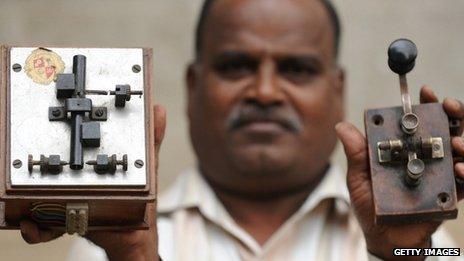Indian media: Telegram nostalgia
- Published

A telecommunications officer showing antique telegraph equipment used in sending messages through Morse code
Media in India are reminiscing over the rich history of the 160-year-old telegram service, which is to wind up soon.
The government has decided to discontinue the telegraph service from 15 July due to massive losses, sparking a feeling of nostalgia in newspapers.
Editorials are remembering the telegraph service's importance during the British rule and the role of the humble postman, who was the bearer of all kinds of news, in connecting rural India to cities and to the world.
"The postman fishing out a telegram from his satchel is an abiding image in many of our earlier movies, at least for those of us of a certain age. The recipient would tear it open with trembling hands, for there was always an element of urgency about a telegram," The Hindustan Times, in an editorial, external, says.
"Tersely worded, printed out in capital letters, sentences ending with the dramatic "STOP", nothing can bring it home like a telegram," says The Indian Express, external.
The paper adds that cutting the telegraph wires was a "favoured form of nationalist protest" in India during the time of the colonial rule and was "invaluable" to the British during the Indian uprising of 1857.
"The extinct service will leave only memories now of a day and age in which the postman cycled in a hurry to convey the good or bad news, or even better, came with a telegraphic [postal] money order from a generous relative", writes The Asian Age, external.
Hindi newspaper Amar Ujala, external says "the service had an emotional connect with people. From mothers waiting for a message from their sons working in cities to soldiers in borders areas expecting messages from home, a telegram always surprised people".
Moving on to politics, newspapers are discussing the relevance of the "third front", a possible alliance of regional parties excluding the main opposition Bharatiya Janata Party (BJP) and the ruling Congress, ahead of the general elections due next year.
Regional parties, like West Bengal's Trinamool Congress and Orissa's Biju Janata Dal, started talking about alternate political alliance after reported differences between the BJP and its key ally Janata Dal United earlier this week.
The Pioneer, external, however, says the concept of a third front has "inherent flaws" and it lacks a "cohesive structure".
"Its ambition to be taken seriously as a political player seems just as much of an overreach," says the The Indian Express, external.
Population concerns
Meanwhile, India will become the most populous country in the world by 2028, surpassing China, a UN report released on Thursday says.
"The report also shows that India has the worst sex ratio, behind only the Middle East," the Hindustan Times, external reports.
Moving on to sports, the All India Football Federation is hopeful of getting the rights to host the under-17 FIFA World Cup, after securing clearance from the government, reports the NDTV website, external.
Meanwhile, badminton champion Saina Nehwal seems be on track to defend her Indonesia Super Series title after finishing a comfortable straight-game win over Sayaka Takahashi of Japan in the quarterfinals, reports The Times of India, external.
However, the national hockey disappointed fans in India with their dismal 4-4 draw against lower-ranked Ireland in the World Hockey League in Rotterdam, reports the Daily Pioneer, external.
Meanwhile, the Chief Minister of Goa state, Manohar Parikkar, says sex education could soon be made compulsory in schools in the state on the recommendations of a legislative committee, reports the Deccan Herald, external.
And finally, India's oldest rock band Indian Ocean is heading for a split after Sushmit Sen, the band's co-founder and guitarist, has decided to leave the group after 23 years, reports the India Today, external website.
BBC Monitoring, external reports and analyses news from TV, radio, web and print media around the world. For more reports from BBC Monitoring, click here. You can follow BBC Monitoring on Twitter , externaland Facebook, external.